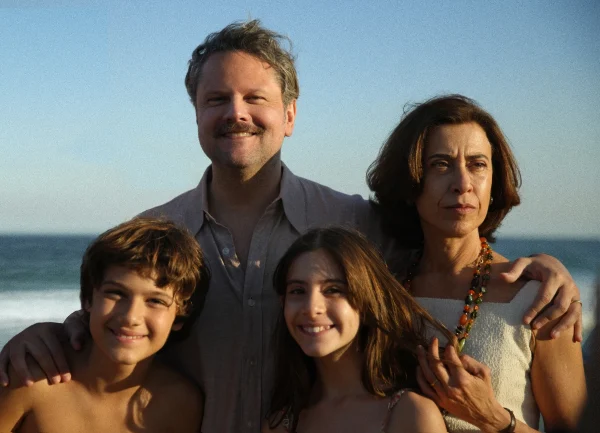Mentally, I’m still in that movie theater seat. I turned to look at my mom, who had tears streaming down her face as the images on the screen depict the events that her family experienced. Even though it has been a couple of days since I watched it, the Brazilian film based on a true story titled “I’m Still Here” is so rich with history and unforgettable emotion that it has been trapped in my mind ever since.
Directed by Walter Salles, the film opens with protagonist Eunice Paiva (Fernanda Torres), a mother of 5, floating in the ocean off the shore of a Rio De Janeiro beach. The year is 1971 and is following the overthrow of Brazilian president João Goulart by a military coup; the era of dictatorship in Brazil has begun. Despite the state of their country, the Paiva family leads a relatively normal life: they play on the beach, host dinner parties and listen to banned music such as Caetano Veloso and Gilberto Gil.
One of my favorite parts of the film was getting to see what Brazil was like in the 70’s. It is mostly in the beginning that we get a glimpse of this as this is when the characters are living their normal, everyday lives. Much of my own family is from Brazil, and I lived there for quite some time, so I naturally have always been fascinated by the idea of Brazil through the decades. Vera Paiva (Valentina Herszage), Eunice’s eldest daughter, is a quintessential depiction of teenhood during this time. She listens to banned music, smokes and fights back against the dictatorship. But her activism is cut short when she leaves for a trip to London with the family of her best friend and during the time that Vera is away on her trip, that’s when the real story begins.
Rubens (Selton Mello), the husband of Eunice Paiva, is taken from his home one night and brought in for questioning for unspecified reasons– an experience that many real-life congressmen in Brazil had to endure under the dictatorship. Eunice and second eldest daughter Eliana (Luiza Kosovski) are also both kidnapped shortly after and taken in for questioning where they experience abuse and torture. While this abuse is not specifically shown in the film, it was a common experience that everyone that was questioned by the military faced.
The rest of the film follows Eunice’s experience with trying to find and free her husband, and the Paiva family’s story of coming to terms with the reality of their life and accepting the fact that nothing will ever be the same. It is a beautiful medley of family, grief and learning to live life and love to the fullest in a time of despair. This despair is what inspired Eunice to fight for justice for all of those kidnapped during the dictatorship. She took her grief and turned it into fuel for her activism, which stands as an inspirational message to everyone that watches the film: it is not what happens to you, but what you do with your experience that counts.

The cinematography of the film was outstanding. The constant shift in scenes from the sunny, ebullient outdoors where there are no worries to then shift to the dim indoors where the characters must come to terms with real life. These subtle details make for many beautiful and metaphoric frames that provide insight into the characters internal feelings. Outside in the sun, they are a family and all of their worries seem a bit lighter, but when they re-enter the indoors, they are faced with the realities of the dictatorship and that their family is falling apart under it.
Although the movie was made in Brazil and directed by a Brazilian director, it has experienced abundant success in the world of American cinema. On Jan. 5, Fernanda Torres took home the Golden Globe for Best Actress in a Motion Picture Drama, beating Nicole Kidman, Kate Winslet and Angelina Jolie– all extremely talented women I may add– and just goes to show how truly phenomenal Torres was in this role. Her acting captured the pure and intense emotion of Eunice Paiva and brought tears to my eyes. She played the role of a strong woman who had to hold herself together for her family so well and really conveyed the hardships that women in her position had to endure. The film is also nominated for multiple Oscars including Best International Film, Best Actress and the most coveted Best Picture.
The film is based on the memoir “Ainda Estou Aqui” –which translates to “I’m Still Here”– by Marcelo Rubens Paiva, who wrote the book that was published in 2015 about his own family’s experience under the dictatorship. He began writing it after his mother was diagnosed with Alzheimers so that he could tell her story to future generations in order for those stories not to be forgotten.
To me, this film was much more than just a two hour and 15 minute watch; it opened up the door to a whole story that I had no idea existed. I knew of the dictatorship, however I had never thought to ask my family about their experiences, and this film inspired me to do so. My own grandmother lived through the dictatorship while raising my mother and her three siblings and although she doesn’t speak of it much, upon asking her, she became extremely open about her family constantly living in immense fear during this time. This movie was specifically important to me because I grew up knowing that it was something that happened, but I had only ever known my family’s story. However, I think it is still crucial for people who don’t have any ties to Brazil to watch this film and learn about this period in history. By watching it, anyone can understand the power that politics can have in families to both tear them apart and bring them together, as well as the force that love –whether romantic or familial– has to overcome it.




